|
|
|
Sort Order |
|
|
|
Items / Page
|
|
|
|
|
|
|
| Srl | Item |
| 1 |
ID:
036808
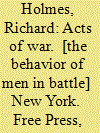

|
|
|
|
|
| Publication |
New York, Free Press, 1985.
|
| Description |
xii, 436p.
|
| Standard Number |
0029148510
|
|
|
|
|
|
|
|
|
|
|
|
Copies: C:1/I:0,R:0,Q:0
Circulation
| Accession# | Call# | Current Location | Status | Policy | Location |
| 032881 | 306.27/HOL 032881 | Main | On Shelf | General | |
|
|
|
|
| 2 |
ID:
067863
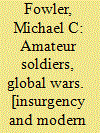

|
|
|
|
|
| Publication |
Westport, Praeger Security International, 2005.
|
| Description |
xiii, 183p.
|
| Standard Number |
0275981363
|
|
|
|
|
|
|
|
|
|
|
|
Copies: C:1/I:0,R:0,Q:0
Circulation
| Accession# | Call# | Current Location | Status | Policy | Location |
| 050811 | 355.0218/FOW 050811 | Main | On Shelf | General | |
|
|
|
|
| 3 |
ID:
179358
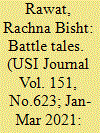

|
|
|
|
|
| Summary/Abstract |
The author has been chronicling wars for a while. She has found that the most fascinating part of the exercise has been the interaction with the magnificent soldiers who fought these wars and came back to us and can now tell us not just their own stories but also those of the braves who could not return. The article narrates some of those stories that she has gathered.
|
|
|
|
|
|
|
|
|
|
|
|
|
|
|
|
| 4 |
ID:
145308
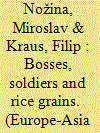

|
|
|
|
|
| Summary/Abstract |
Since 1975, the numbers of Vietnamese living in Europe have steadily increased. As new emigrants appeared in various countries, new types of crime came with them. Also in the Czech Republic, where a relatively large Vietnamese diaspora has been in existence since communist times, numerous Vietnamese criminal networks were established. The Vietnamese networks have a specific structure and modus operandi. Their bosses create parallel power structures within the Vietnamese diaspora and frequently merge together legal and illegal activities. The Vietnamese criminal networks are engaged in a broad spectrum of criminal activities, including economic crime, people smuggling and trafficking in drugs.
|
|
|
|
|
|
|
|
|
|
|
|
|
|
|
|
| 5 |
ID:
150984
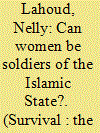

|
|
|
|
|
| Summary/Abstract |
With a small number of high-profile exceptions, the Islamic State’s women are expected to be the enablers, not the agents, of jihad.
|
|
|
|
|
|
|
|
|
|
|
|
|
|
|
|
| 6 |
ID:
108847


|
|
|
| 7 |
ID:
106171


|
|
|
| 8 |
ID:
142334
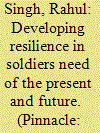

|
|
|
| 9 |
ID:
177745
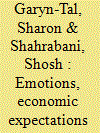

|
|
|
|
|
| Summary/Abstract |
Using data from a field study conducted among soldiers during the 2014 Protective-Edge military operation (OPE) in the Gaza Strip, this article examines the effect of exposure to war on soldiers’ emotions, economic expectations, and willingness to take risks. The results suggest that combat soldiers who took part in OPE were more willing to take risks and more optimistic. The analytical results indicate that among combat soldiers, levels of negative emotions were negatively related to individual economic expectations, while being present in the staging area close to OPE significantly and positively affected the level of their economic expectations.
|
|
|
|
|
|
|
|
|
|
|
|
|
|
|
|
| 10 |
ID:
101727


|
|
|
| 11 |
ID:
075204


|
|
|
|
|
| Publication |
London, Macmillan, 2006.
|
| Description |
xii, 544p.: ill., table, maps.Hbk
|
| Standard Number |
0333692853
|
|
|
|
|
|
|
|
|
|
|
|
Copies: C:1/I:0,R:0,Q:0
Circulation
| Accession# | Call# | Current Location | Status | Policy | Location |
| 051989 | 940.53/DAV 051989 | Main | On Shelf | General | |
|
|
|
|
| 12 |
ID:
185255
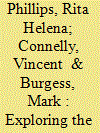

|
|
|
|
|
| Summary/Abstract |
Evidence suggests that most of the UK public appreciate currently serving UK Armed Forces personnel but are less positive in their beliefs about veterans. This research examined the social representations held by civilian participants of UK veterans and serving soldiers to understand why veterans may be seen more negatively. An open-ended word association task was completed by 234 UK participants where they were asked to provide three initial responses to the words “veteran” and “soldier” and to evaluate their responses in accordance to prototypicality. The 1,404 resultant associations were grouped into 14 thematic clusters. Using the hierarchical evocation method, the results suggest “heroizing associations” to be a defining core element for “soldier” and “veteran” but “victimizing associations” to be an element only for “veteran.” Principal component analyses suggest victimizing associations are related to war and deindividuated associations; “heroizing associations” are related to characterizations of the veteran’s personality. Implications and future directions are discussed.
|
|
|
|
|
|
|
|
|
|
|
|
|
|
|
|
| 13 |
ID:
175326
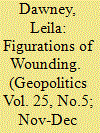

|
|
|
|
|
| Summary/Abstract |
This article argues that the figures of the wounded and dead soldier are central organising nodes in public objects, events, and institutions and are generative of intense affects and feelings, which are in turn bound to and constitute geopolitical imaginaries. Through these figurations, bodies of wounded and dead soldiers are brought to visibility, becoming key technologies for the production of authority and attachment, and fostering powerful affective responses in publics that work to amplify and enliven particular forms of neoliberal militarised nationhood.
|
|
|
|
|
|
|
|
|
|
|
|
|
|
|
|
| 14 |
ID:
126346


|
|
|
|
|
| Publication |
2013.
|
| Summary/Abstract |
Movies continue to be the most accessible art form to Americans and that reach allows films to have a tremendous effect on moviegoers. With more than a billion movie tickets sold annually in the United States, the ability of movies to influence the perceptions of moviegoers is pronounced. Frequently, the government is part of those depictions. Although film is routinely studied in a host of disciplines, a focus on the portrayal of government generally and government officials more specifically, remains elusive. Instead of using a case-study approach, we examine recent, popular films to investigate how government is portrayed generally and how individual governmental characters are depicted. For our sample, we use the top-10 box office grossing films from 2000 to 2009 to assess how government is depicted in the films most likely seen by the majority of movie-watching Americans. Perhaps unsurprisingly, we found that films generally have a mixed view of government with more negative depictions than positive. However, in examining bureaucrats, police officers, soldiers, and politicians, we found a much more positive depiction of these individual government characters. Americans may view government negatively, but in film they see positive depictions of individual civil servants.
|
|
|
|
|
|
|
|
|
|
|
|
|
|
|
|
| 15 |
ID:
105353
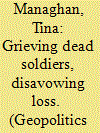

|
|
|
|
|
| Publication |
2011.
|
| Summary/Abstract |
The article investigates the conditions of emergence of Cindy Sheehan (mother of soldier killed in Iraq) as a spokesperson of the American antiwar movement and its so-called 'spark.' It interrogates the emotional pull of the current 'support the troops' rhetoric and the usurpation of this and other patriotic signs and symbols by various antiwar groups as both a constraint on the realm of legitimate dissent and an enabling condition of intelligible subject formation - with particular attention given to the figure of the grieving mom. This article argues that the sympathetic, albeit tenuous, identification with this figure emerged through a simultaneous psychic identification with and disavowal of loss - with implications for the possibility and impossibility of dissent in the aftermath of 9/11.
|
|
|
|
|
|
|
|
|
|
|
|
|
|
|
|
| 16 |
ID:
109282
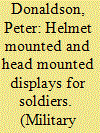

|
|
|
| 17 |
ID:
167826
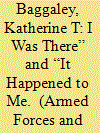

|
|
|
|
|
| Summary/Abstract |
Various theoretical frameworks have been applied in an attempt to understand the phenomenon of killing. While previous studies have examined killing as an outcome-oriented measure, few have explored killing as a narrative. Using letters written by soldiers, police officers, and security professionals found in the magazine Soldier of Fortune, this study examines the reported behaviors that occur during the killing process and argues that the process of killing is best understood as an adventure narrative. Applicability of findings to other homicides is discussed.
|
|
|
|
|
|
|
|
|
|
|
|
|
|
|
|
| 18 |
ID:
124235


|
|
|
|
|
| Publication |
2013.
|
| Summary/Abstract |
A decade ago, in the autumn of 2003, a small group of soldiers criminally abused detainees at the Abu Ghraib prison in Iraq. Two divergent narratives explaining these events emerged: a "bad apple" narrative and a "bad barrel" narrative. Neither does justice to the complex interplay of policy, organizational, and individual factors that contributed to these tragic events. A perfect storm of poor leadership, chaotic and confusing policy changes, and a small group of corrupt and immoral soldiers produced this fiasco with global consequences
|
|
|
|
|
|
|
|
|
|
|
|
|
|
|
|
| 19 |
ID:
178255


|
|
|
|
|
| Summary/Abstract |
This article argues that, through the coup, the military has become more visible in national politics in post-Mugabe Zimbabwe. The current situation under President Mnangagwa marks a qualitative difference with the military under Mugabe’s rule. Currently, in now being more prominent, the military is politics and is the determinant of any political transition that may be forthcoming in Zimbabwe. However, if it deems it necessary, the military accommodates civilian politicians into politics in order to ‘sanitize’ the political landscape in its own interests. Simultaneously, despite their involvement in the coup, ordinary soldiers feel increasingly marginalized under Mnangagwa’s government.
|
|
|
|
|
|
|
|
|
|
|
|
|
|
|
|
| 20 |
ID:
142322
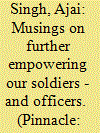

|
|
|
|
|
|
|
|